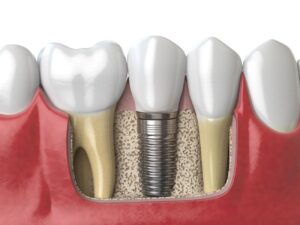Dental implants provide long-lasting, durable tooth replacement, but these restorative fixtures are not indestructible. Without proper care, a dental implant might fail, requiring urgent attention from your dentist.
Dr. Ira Goldberg, a dentist and implant dentistry expert in Succasunna, NJ, shares more details about how you can preserve your new dental implants. Check out his recently published article below.

The “Eternal” Dental Implant
Dental implants have improved the lives of countless individuals throughout the world. Within the U.S. alone, it is estimated that 5 million implants are placed each year. There are a lot of reasons why people seek out dental implants: increased chewing ability over dentures, improved esthetics, not having to cut down adjacent teeth for bridgework, and the fact you can’t get a cavity on a dental implant are some examples.
However, many people unfortunately believe that things can’t go wrong with dental implants: that they are indestructible and will last forever. This is a misconception. Dental implants do have very high success rates: they can extend over 95%. Unfortunately, things can go wrong. This article addresses some of these issues, and what can be done for a failing implant.
What Impacts the Success of a Dental Implant?
Health: Your health is a leading factor. Systemic diseases affect your whole body, and your mouth is not isolated from your body. Diabetes, thyroid activity, autoimmune diseases, and osteoporosis are examples of conditions that require discussions with your implantologist. Smoking is a social activity that can negatively affect not just your health, but also dental implants.
Medications: Certain medications, such as SSRIs, SNRIs, and PPIs can affect bone metabolism and put dental implant patients at risk for complications.
Past History of Gum Disease: A past history of gum disease increases a person’s risk of having dental implant complications.
Bite Patterns/Occlusion: Replacing one or more missing teeth without paying attention to the condition of your remaining teeth can be extremely destructive to dental implants. Your dentist is not trying to “oversell” you when they discuss this with you. We understand all you want is just one implant for the front tooth that broke “on a piece of soft bread.” However, the rest of the teeth in your mouth can affect that “one tooth.”
Complexity of the Presenting Problem: Not all situations are equal. Two people presenting for a dental implant for the same tooth can have polar opposite presenting conditions. One person may have a large amount of available bone, while the next person may have very little bone and the location is near important anatomy, such as a sinus or nerve.
What Treatment is Needed for Dental Implant Problems?
So what do you do about an implant that is starting to lose bone, develop deep pockets, bleeds, or is tender? Or sometimes you’re not even aware of problems, and your dentist or hygienist is making you aware of concerns.
There are two terms: “peri-implant mucositis” and “peri-implantitis” used often within dental implantology. The first identifies that there is no bone loss around your implant and the problem is limited to the gums, and the second indicates you are starting to see bone loss.
Treatments for peri-implant mucositis include maintenance. No surgery or advanced therapy is necessary. Improved home care and more frequent professional cleanings are usually all that is necessary.
Peri-implantitis requires intervention. Depending upon the level of the problem, different modalities are available. Reshaping of bone, grafting, treatment with different medications or chemicals, or laser treatments are options. If the problem is advanced enough, implant removal is oftentimes advised. Not removing a failing or infected implant can affect surrounding teeth or implants.
You should not necessarily expect the dentist who placed your implant to be capable of treating peri-implantitis. They may not have the proper equipment or supplies or be aware of the techniques. By no means is this a negative reflection upon the practitioner. Interception of an ailing or failing implant can be very difficult, and the knowledge base changes often.
Can My Dentist Save a Failing Dental Implant?
Success rates of treating failing implants are not always very high. Please remember the treatment is not being performed in a “bubble.”
The factors mentioned above come into play: a person’s health, smoking history, past history of gum disease, etc. So you may go through an entire rehabilitation process for the implant(s), and still have a negative outcome.
Fees for implant rehabilitation vary greatly, depending upon the extent of the problem. However, these procedures can be expensive, and no guarantees can be provided. Insurance also does not usually cover the treatments.
In summary, dental implants are a fantastic discovery in the world of dentistry and have turned around countless lives. However, problems can arise and need to be dealt with. Your best prevention is to go for your regularly scheduled checkups so that your dentist can help you keep an eye on your investment.
